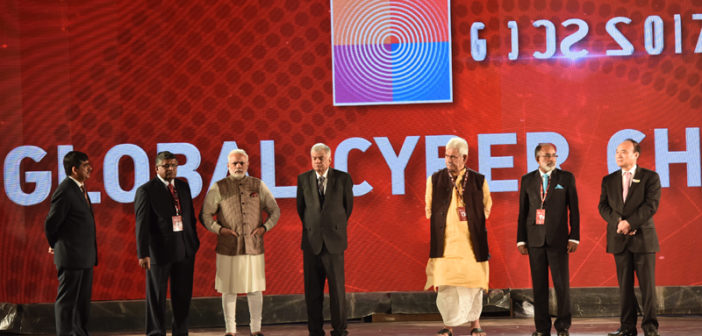Minister of Law & Justice and Electronics & Information Technology Ravi Shankar Prasad advocated for the open internet access to all. He said that given India’s focus on keeping internet open for localised ideas and concepts, the right for all to access the internet is “non-negotiable”. “Internet is supposed to be democratic. It is a big global platform, but must be linked the local ideas and concepts. That is the very clear focus of India, and therefore the right of access is non-negotiable.” Reports Amit Bhanot in Governance Democracy&Politics (GDP), December Issue
Prime Minister Narendra Modi, inaugurated the Global Conference on Cyberspace 2017 in the Delhi on November 23 in the presence of, Mr. Ranil Wickramasinghe, Prime Minister of Sri Lanka. PM also launched the UMANG App that aims to bring 162 government services on a single mobile app, with a larger goal to make the government accessible on the mobile phone of our citizens. Importantly UMANG is a single mobile app to access 1200+ services of various government services from Centre, State and utility services and supports 13 Indian languages and caters to on-demand scalability. It will soon support feature phones without internet connectivity through USSD.
During the conference Minister of Law & Justice and Electronics & Information Technology Ravi Shankar Prasad advocated for the open internet access to all. He said that given India’s focus on keeping internet open for localised ideas and concepts, the right for all to access the internet is “non-negotiable”. “Internet is supposed to be democratic. It is a big global platform, but must be linked the local ideas and concepts. That is the very clear focus of India, and therefore the right of access is non-negotiable.”
He said, “We have innovated new strategies and technologies, which focused on Affordability, Inclusion and Development focus. Let me share with you a glimpse of how this has helped us to transform India. India would be a voice of moderation. India would be a voice of reason. India would be a voice of assimilation as far as Internet discourse is concerned. But let it be known that India would be a voice of assertion in favour of those who are digitally deprived. Because Digital India has been designed to bridge the gap between digital haves and digital have-nots. I think it is very important that we understand that through digital empowerment we are creating an equal world which would truly reflect our motto of cyber4growth and cyber4all.”
Themed on Cyber4All: A Secure and Inclusive Cyberspace for Sustainable Development, this is the fifth edition of GCCS wherein international leaders, policymakers, industry experts, think tanks and cyber experts will gather to deliberate on issues and challenges for optimally using cyber space. The overall goals of GCCS 2017 are to promote the importance of inclusiveness and human rights in global cyber policy, to defend the status quo of an open, interoperable and unregimented cyberspace. Manoj Sinha, Minister of State(IC), Department of Telecommunication, Government of India, KJ Alphons, Minister of State, Tourism, Ministry of Electronics and Information Technology, Government of India, Secretary General of International Telecommunication Union, Houlin Zhao were present at the conference.
Ravi Shankar Prasad said, “The fundamental philosophy of our government led by Prime Minister Narendra Modi is ‘Sabka Saath, Sabka Vikas’ (cooperation of all for development of all). Digital India seeks to realise this goal of inclusive development by using the tools of technology. The digital India vision of our Prime Minister Narendra Modi has given a new approach to achievement of the Sustainable Development Goals of the United Nations. It has given a new paradigm of technology led development for sustainable development. The spectrum of India’s digital development ranges from digital delivery of services to rising digital economy powered by 1.3 billion people and reinforced by demographic dividend where 65% of them are below the age of 35.”
“India’s quest for a safe and secure cyber space flows from India’s commitment for an inclusive digital world leading to inclusive and sustainable development. India is privileged to host over 4000 distinguished delegates from 131 countries who have come together to give a safe, secure and sustainable digital future to the humanity. The real power of Cyberspace is in the economic and social benefits of the digital content, and in the empowerment of the poor, common citizen- which is the only way to ensure both free access to markets and the vindication of vital public interest objectives,” he added
The Prime Minister also felicitated the winners of the Global Cyber Challenge called Peace-a-thon. The winners were declared following a 36-hour challenge in the Grand Finale of the Hackathon, wherein hundreds of teams from throughout India and from countries like USA, Canada, France, Argentina, Australia and Algeria turned up to showcase their talent and compete in the challenge.
Incepted in 2011 in London, second GCCS was held in 2012 in Budapest with focus on relationship between internet rights and internet security, which was attended by 700 delegates from nearly 60 countries. The third edition of GCCS was held in 2013 in Seoul with commitment to Open and Secure Cyberspace. The fourth version GCCS 2015 was held on April 16-17, 2015 in The Hague, Netherlands, which saw participation from 97 countries.





